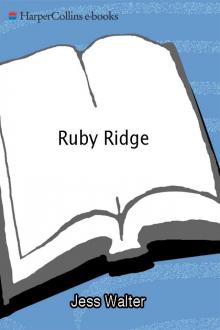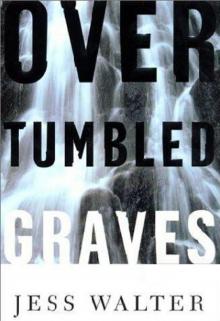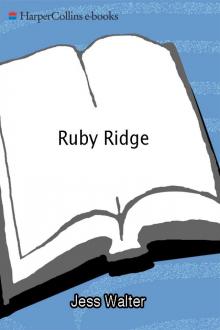- Home
- Jess Walter
The Financial Lives of the Poets Page 3
The Financial Lives of the Poets Read online
Page 3
And as much as I’m glad to see Dad reminiscing, I step in. “That’s enough, Dad.”
“Eeww, Grandpa,” Franklin says. “You smoked cigars? That’s bad for you.” Among the world’s evils—fascism, ethnic cleansing, environmental degradation—smoking deserves the most severe curricular attention in my kids’ school. At least my new friends Skeet and Jamie have escaped this indoctrination.
I glance out the window to see Lisa’s ten-year-old Subaru backing out of the driveway. I wave, trying to recall whether she said goodbye. Or said anything. She’s already on her phone. She’s always on her phone now, or the computer. It’s her new life. I make my way upstairs, glance at the computer, but I don’t feel like doing recon on Lisa’s online life right now, so I do a few push-ups, fewer sit-ups, take a shower—fourth in line, I get lukewarm—dress in the same weedy clothes I was wearing last night. Downstairs, Dad is planted in front of the television, where he spends his days, switching from old movies to news and back. He pets his universal remote control like a tiny cat.
Ten minutes later, I’m driving the kids to their little parochial school. When Lisa and I violated the first rule of real estate by buying a big house in a questionable neighborhood, we landed near a low-income public school—and after Lisa investigated (“I heard a first grader call her teacher Ass-face”) we decided to shop around for the best private school we could afford. This turned out to be a little Catholic shop a few miles away—odd since neither Lisa nor I is Catholic. This whole private school thing would baffle my Dad: not that we’re sending our kids to a religious school whose religion we don’t practice, but that I drive the kids to school every morning when a perfectly good squash-colored school bus rolls past our house. It would seem insane to him that I willingly pay tuition beyond my taxes. In fact, Dad would be outraged by the whole idea of being a consumer of schools. My parents never shopped for schools. It would have been like shopping for water, like shopping for air. It wasn’t that Mom and Dad chose to be public-school people; it just would never have occurred to them there was a choice. If a school bus pulled up, whatever children were in the house were expected to file outside and get on the bus. It didn’t matter if the bus was going to the compound of a racist, survivalist, apocalyptic cult—bus pulls up; kids get on. Of course, the schools I attended were god-awful; that bus took me to a junior high that was more bong and nunchuk factory than school. So maybe education shopping isn’t such a bad idea.
“I love you guys,” I say as we pull up to the old brick school building; uniformed urchins seep from assorted foreign sedans and big Catholic-family Suburbans and Expeditions. “Have a great day learning about the evils of smoking.”
“Whose hat?” Franklin holds up the flat-brimmed, black and silver Raiders cap.
“Skeet’s,” I say.
“Oh,” Franklin says, as if this makes sense.
Teddy grabs the hat and somehow knows exactly how to wear it, cocked a bit sideways and off-center. It’s amazing how this kind of knowledge filters like an aquifer beneath the adult surfaces of the world, how everyone under thirty speaks the same subtle cultural language. Our parents’ parents blamed records, our parents blamed MTV, and we blame MySpace or some other Internet villain, but I suspect it’s the microwaves I was telling Skeet about; maybe they’re not benign…maybe they beam style advice to the young, and on some unseen command the children of the world will one day band together and slit their parents’ collective—
“Take the hat off, Teddy.”
“Jawohl, herr commandant.” He drops the hat in the backseat and the boys jump out, start walking toward the school in their wrinkly blue chinos and white polos, and I think these uniforms wouldn’t be so bad if they didn’t make the kids all look like bank tellers on casual Friday or the employees of a discount airline or—like me…
Truly amazing, this pot. I have gone through at least five strata of high since those first hits on Jamie’s blunt: the calm and the paranoia and the weepy displeasure, then the euphoria and rolling epiphanies, and now I seem to have a hyper-fluent sense of the world, as if I’ve traded in my old vacuum tube eyes for a pair of high-def LCDs. It’s no wonder jazz musicians are so certain they write better stoned.
In fact, maybe there’s something there for me, too. Linking free-verse poetry and financial advice was obviously a bad idea, and thinking my two passions would translate to the larger world was out-of-control hubris, even in the epoch of hubris we are passing out of…but this new idea forming in my mind makes some real sense—
I will be the baked financial journalist, Moneydude, Stoned Stock Analyst. I’ll start a blog, get high every morning and give stock tips with the clarity I’ve achieved from deep-frying my skull in B.C. bud: Tip 1. Time to take a flyer on Frito-Lay stock. Why? Because, man…that queso cheese dip? Damn!…Tip 2. Zig-Zag Papers are poised to make a second-quarter rally because…yo, it’s all summer and shit. Tip 3. The P-to-E ratio on A-Metro Trans-Solutions makes it a can’t-miss stock given the Democratic Congress’s likely emphasis on subsidizing mass transit projects. (And, dude, their logo totally looks like a vag!)
I drive through a forest of leftover political signs, red and blue and black and white and good and evil; the experts say we are polarized again, but I think we’ve become bi-polarized, and I leave the parking lot, pull out into the world, merging into something larger than myself, perhaps bleeding into the flow of history as we’re on the verge of…
What? What was that? I lost it. Shit. A merge on the verge of the surge of…Tyger! Tyger! burning bright…
Damn. What was I thinking about?
Sprinklers? Internet? Forbearance? Unraveling? Slurpees?
No, it is very good pot.
CHAPTER 3
Social Networking
MY WIFE TYPES HER life, key-by-key
site-by-site, primarily at night,
on the home PC where I try to find
work while she’s drowsing, instead
find the history of her browsing,
surfing her lost past for evidence
that she wasn’t always this sad—
Still, I’d convinced myself, at least until last night, that Lisa’s new online hobby, social networking, was a healthier compulsion than the brief, eBay shopping spree she went on last year (our garage lined with unsold remnants, nine boxes of commemorative plates, plush toys and china figurines). At one time, Lisa managed this online life at work, but the optometrist’s office where she rots as a receptionist for thirty hours a week without benefits put an end to personal computer use, so every night now Lisa spends two hours on our home computer, managing her Facebook page and her Linked-In page and her MySpace page, responding to ass-sniffing inquiries from old friends on Classmates.com and Google-imaging people she used to know. I don’t say a word about any of it—this was our couples-counselor’s advice—but I worry that what she’s really looking for is not the people she once knew, but the her she once was, some happier version of herself living a better life than the one she has with me.
Of course, it’s unwise to diagnose the mental condition of one’s spouse. But if I had to trace Lisa’s current malaise (and if I didn’t trace it to the moment she accepted my marriage proposal) I would say that it began when her confidence was battered by leaving her career to birth those two boys eleven years ago. Before that, Lisa was a world-beating, self-assured businesswoman, in charge of marketing a doctors’ group that specialized in sports medicine, and she ventured out every day in curvy business suits that made me want to coax her into elevators for inappropriate workplace contact. But then I spermed her up and she left that good job, and since I was earning decent money and making indecent profits on some canny investments, we felt safe and maybe even wise—perhaps even morally good—having Lisa quit her job while she nursed, nested and nurtured those thankless little shit-heels. Then, a decade on, with the boys safely ensconced in papist school, we figured she’d just go get another job like her old one, but she ventured back into
the job world two years ago with none of the hot confidence she’d had before we procreated. I try to put myself in her position—one day you come home from work a vital twenty-nine-year-old babe, whom the fellas at the office actively lust after (a real pro, too, trained in the latest technology, terminology and theory) and next day you go out looking for work a nearly forty-year-old Mom who colors the gray and doesn’t even know PowerPoint, a short-tempered lady who didn’t get any sleep last night because one of the kids pooped his bed (how do you poop a bed, anyway?). Six months of résumés, referrals and rejections took their toll and Lisa accepted the first job she was offered—receptionist for a dull optometrist who calls the women in his office gals, and whose idea of a Christmas bonus is twenty-five bucks at a craft store.
I hated seeing the woman I loved lose her confidence that way. And yet, in the deepest reaches of my psyche, I wonder if there wasn’t a part of me that was glad she didn’t go back to the gym-toned guys at the sports medicine clinic. Our marriage was typical, I think; we deluded ourselves that it was made of rock-solid stuff, but there were trace elements of regret, seams of I-told-you-so, cracks of martyrdom. In the last few months—with things around here deteriorating—I’ve even asked myself if I didn’t take some pleasure keeping my wife at home, that maybe I subconsciously preferred a depleted Lisa because I was threatened by the sexy, confident one, the one I couldn’t control, the one I could lose. If so, then I am an even smaller man than the out-of-work, out-of-gas loser who greets me in the mirror every day, and maybe I deserve my unraveling fate, pushed away from this beautiful beaten wife, who goes out every night on the Internet in search of her better self—pre-child, pre-forty, pre-me.
More self-pity. It’s ugly. Counterproductive. I constantly warn my sons about the dangers of self-pity when they’re moping about being the only kids in the world without a Nintendo Wii. And honestly, with Lisa and me, it hasn’t been that bad. Beneath our current troubles, I think we still like each other, and as flatly unromantic as that might sound, it’s amazing how many of our couple friends genuinely don’t. Lisa and I still root for each other, still make each other laugh, still have fairly successful sex at least once a week, sometimes more—at least we did until about a month ago, when this dry spell started. We have similar goals and interests. Share the same politics. And (I realize I’m making the case to myself) we don’t even argue much. Certainly we did argue some last winter and spring, when our finances fell apart, but even then Lisa and I didn’t argue so much as not talk—our little ballet of sighs, pursed lips and hushed voices as I worried over mortgage statements and retirement bulletins and over the increasingly terse letters from various lenders and financial institutions—grim reams of paper that have led me today to the office of Richard Blackmore, our financial coroner…I mean, planner.
When the hole started opening two years ago, Lisa and I congratulated ourselves because at least we weren’t in one of those La Brea Tar Pit adjustable-rate home loans. We had a normal thirty-year, with a normal fixed rate, and even though we’d unwisely cashed in equity for a couple of costly remodels, we were still okay. We had some normal debt: normal credit cards, normal furniture layaways, normal car payments, some uncovered medical bills, Teddy’s normal braces and Franklin’s normal speech therapy (Oh, for God’s sake, just say your ‘R’s). But then my perfectly normal dream of starting my own business, the afore-derided poetfolio.com, turned out to take longer and be more costly than we thought, and we found ourselves taking another line of credit on the house, going deeper in debt. Then came Lisa’s abnormal online shopping binge, and our credit cards rolled over on us a couple of times and the car payments lapsed and the ground began slipping away and the only thing that seemed rock steady was the house, so we took another chunk out of it, just to catch up, we said, to temporarily cover living expenses, and we refinanced at the peak value; like a snake eating its tail we borrowed against our house to pay the house payment of a house leveraged at forty percent more than the house was worth. When the dip came I scrambled back to the newspaper, but with the hole growing deeper and monthly interest charges eating us alive, we fell further behind, missed a few house payments and our helpful mortgage lender offered us an “agreement of forbearance,” six months leeway (with interest!) to get on top of our payments, and we jumped at that lifeline, but then I lost my job and maybe we were distracted by that and by my father’s collapse (we dragged him into the hole with us) because while we fretted and waffled and stalled, the stock market went out for milk, got stoned and lost forty percent of its value, depleting my 401(k), which, due to my stubborn love for financial and media stocks, had already begun to look more like a 4(k). That’s about the time I stopped showing Lisa the grim letters about the house, with their phony warm salutations (“Dear Homeowner…”).
This is how a person wakes up one morning to find that he’s six days from losing his house.
The advice you get when your mortgage is in danger is to “contact the lender.” The last time I contacted my lender, some twenty-five-year-old kid answered the phone and talked me into forbearance, this six-month amnesty of procrastination. I should have known it was a bad move when I contacted my lender the next time and found out the kid had been laid off, that our mortgage had been bundled and sold with a stack of similarly red paper to a second company, and that the second company had been absorbed by a third company. Now I have no idea how to “contact my lender.” I seem to spend hours in automated phone dungeons (“For English, press one”) desperately looking for a single human voice to gently tell me I’m dead.
Clock ticks. Planet turns. Six revolutions from now whatever bank owns my mortgage will start foreclosure proceedings unless I can either beg more time or come up with the balloon forbearance payment of $31,200. Meanwhile, I try to figure out how to tell Lisa about this looming deadline—keeping in mind that (a) she adores this house, (b) she was raised to connect financial security to love and (c) I’m quite possibly losing her anyway. So I go it alone.
In the office of Richard Blackmore, Idiot Financial Planner, on the third floor of a squat downtown building, the reception area’s littered with Forbes and BusinessWeek and Investors Daily: crisis porn, full of emphatic dirty-talk about “Hidden Opportunities in the Wreckage,” climaxing charts, “How to Make Money in a Crash,” photos of wet-browed, bug-eyed investment experts looking for full relief in this overheated climate.
The meeting is as predictable as coffin shopping. Richard keeps his diplomas on the wall, and I wonder why journalists and poets don’t do that. He tells me that losing the house might be inevitable, but that it’s only the beginning of my trouble. “Look,” he says, and he plays his adding machine like Jerry Lee Lewis, shows me various groupings of red numbers, offers painfully obvious advice. I could go into deeper detail, but frankly, I’m not that interested in the further specifics. Except these two points: (1) my money guy Richard is going without a tie now, like a politician who wants to appeal to the suffering common man (or perhaps every morning his firm takes the ties and shoelaces away from the brokers and financial planners to keep them from offing themselves); (2) Richard’s basic advice is to liquidate, sell, sell, sell, dump, sell, scale down, sell some more, live “like a fry-cook in the ’70s,” try to get a job, any job “very fucking fast,” beg my lender for more time, and with a great deal of luck we might avoid losing the house and going bankrupt.
This is something like taking your car to a mechanic, only to hear this: I hope you have good walking shoes.
“And by ‘scale down,’ you mean…”
“Scale. Down.”
“Right. And by ‘down’ you mean…”
“Down,” Richard says. His mouth is car-ported by a black mustache, an effective tool for delivering bad news: “Down down down. I’m talking public school down, used-car, canned-food down, lower-middle class down, Matt. Not 2004 upper-middle class down—not eight-person Jacuzzi and lawn guy down—but 1977 generic-food buy-your-clothes-at-K-Mart down. I’
m talking dump your car payment, have a garage sale, clip coupons, Christmas shop at Goodwill. I mean—look at these numbers.” He spins a red page. “You see anything I don’t?”
I see London. I see France. Flood tide below me! I see you face to face! Heat check: still high. “Richard, if we cash out everything, is there any tax benefit to—”
“Tax benefit?” Richard’s mustache spits laughter. “Jesus, Matt. I don’t think you understand.” And he leans forward, his bleary eyes darting around my face. “Once this starts, you can’t stop it. I’ve seen this before. You’re parked on a hill without a parking brake and your car is rolling toward you and the only move is to get out of the way…and you want to talk about tax benefits?”
I should point out that my money guy Richard is not the best money guy in the world. (My first clue in this direction came in the late 1990s, when I was doing pretty well on my own, blindly investing at the height of the tech boom and I let Richard talk me into what he called “a safer bet”—Mexican shipping bonds. So while I had doubled my own easy bets on Microsoft and Cisco, I lost thirty cents on the dollar on Richard’s great tip—that anchor of the business world: Transmaritime-Pacifico.) But if Richard is not the best number guy, he’s a brilliant word guy—probably the reason I stay with him—and should anyone doubt it, the man shifts metaphors while I’m still marveling at the idea of our finances as a rolling car.
“Look,” Richard says. “I’m gonna give you the straight diagnosis, Matt. You are severely hemorrhaging here—not just on the house, in every area possible. Credit-card debt, health care debt, the equity you took on your house, unpaid creditors from your little business venture, your stubborn insistence on riding those bank and media stocks into the ground. And I don’t know who talked you into forbearance, but that’s the worst thing you could have done. It’s just a way for lenders to squeeze the lemon once more. Did anyone tell you that ninety percent of the people who make the big forbearance payment still end up losing their houses?”

 Land of the Blind
Land of the Blind Don't Eat Cat
Don't Eat Cat Ruby Ridge: The Truth and Tragedy of the Randy Weaver Family
Ruby Ridge: The Truth and Tragedy of the Randy Weaver Family Citizen Vince
Citizen Vince Beautiful Ruins
Beautiful Ruins We Live in Water
We Live in Water The Zero: A Novel
The Zero: A Novel The Zero
The Zero The Cold Millions
The Cold Millions Over Tumbled Graves
Over Tumbled Graves We Live in Water: Stories
We Live in Water: Stories Ruby Ridge
Ruby Ridge (2006) The Zero
(2006) The Zero (2004) Citizen Vince
(2004) Citizen Vince